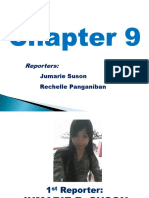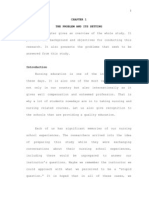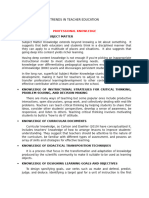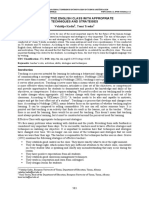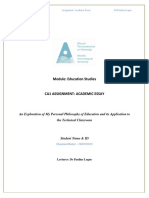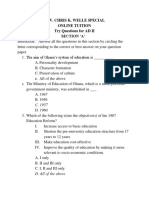Clinical Teaching Strategies Reflection Eg
Clinical Teaching Strategies Reflection Eg
Uploaded by
api-754358642Copyright:
Available Formats
Clinical Teaching Strategies Reflection Eg
Clinical Teaching Strategies Reflection Eg
Uploaded by
api-754358642Original Title
Copyright
Available Formats
Share this document
Did you find this document useful?
Is this content inappropriate?
Copyright:
Available Formats
Clinical Teaching Strategies Reflection Eg
Clinical Teaching Strategies Reflection Eg
Uploaded by
api-754358642Copyright:
Available Formats
Edith Gonzalez-Rodriguez
Capstone Project (Education)
Effective Clinical Teaching Strategies
The American Dental Education Association was founded in 1923 and is “The Voice of
Dental Education.” This association is dedicated to preparing oral health professionals. ADEA is
bringing new thinking and innovation to the next century and beyond, assisting both faculty
members in dental education and scholars. “Effective Clinical Teaching Strategies” was
instructed by Natatlie Jeong, an Associate Professor at Tufts University school of Dental
Medicine. The purpose of this learning session was to explore principles of clinical teaching and
how to effectively apply techniques to encourage student critical thinking in a clinical setting.
Clinical teaching is defined as a form of interpersonal communication between a teacher
and a learner. Many faculty members stated that they face the following challenges in a clinical
teaching environment: often feeling rushed, student preparation and individual attention to each
student. It was very interesting to hear and learn that many faculty members face the same
challenges despite what school or dental course they are teaching. Ms. Jeong referred to Dr.
Sakaguchi’s clinical teaching strategy - iCARE method. Dr. Sakaguchi initially introduced this
method at Oregon Health Science University and it proceeds as the following:
Teacher: iCARE Studnet:
actions:
Inquire about the pt i Initiate a presentation of Dx and Tx plan
Cultivate the use of evidence C Contribute evidence to support Dx and Tx plan
Advise the student on general principles A Apply relevant principles
Reinforce what the student did well R Reflect on what was done
Empower the student E Execute Tx
In respect to effective clinical teaching, providing effective feedback to students is also as
important as the way they are receiving education. When providing students feedback is it
important to establish a respectful learning environment, begin the session with the student’s self
assessment, be specific and most importantly provide feedback in a timely and regular
occurrence (ex: offer feedback at the time of an event or shortly afterwards.) As educators it is
important to self-reflect on the feedback you provide to each individual student, such as “how
Edith Gonzalez-Rodriguez
Capstone Project (Education)
much feedback did you provide?” and “how useful do you think your feedback was?” As doing
so allows educators to change their viewpoint to a student’s point of view and truly identify if
their feedback was delivered thoroughly and useful. Having said that, if students are not
receiving adequate feedback they will begin to assume that all is well, poor performance will
continue to be uncorrected and good performance will not be reinforced. At times, educators may
face barriers to provide quality and adequate feedback. Educators may feel corrective feedback is
awkward to communicate, be fearful to damage their relationship with students, find that
providing feedback is difficult and nonetheless educators desire to avoid undermining the
students self-esteem and most of the time its due to millennial generation issues.
Ms. Jeong stated that many experienced faculty members and school senior
administrators are boomers, which means that they started their education and established their
career’s way before personal computers or cell phones came into existence. With that being said,
the way boomers grew up and finished their career is very different from the way millennials
currently live, communicate and think about life. In today's generation, the internet and
technology have played a significant role in our everyday life, especially with millennials. They
often have very little patiences to face-to-face or one-on-one communication and navigate their
life through social media. Ms. Jeong provided great information on millennials' perspectives.
During her lecture she stated that millennials are often afraid to fail, measure their success by
outcomes not by obedience, don’t want people telling them what to do but need structure, and
possess surface knowledge but struggle with depth. All things considered, as an educator it is
important to analyze the group of students you will be educating as every student and class
absorbs education and feedback differently.
To conclude, I learned that being a good educator goes beyond what school you
graduated from or how long you have been teaching. It is based on how effectively you teach,
manage one-on-one time with students and the manner constructive feedback is provided. What I
valued learning the most out of this learning session was how to use descriptive, nonjudgmental
language when providing feedback to students. Including, comprehending that students with
anxiety in a clinical setting come from low experiences and high independence and students with
frustration come from highly experienced students and low independence, as it is something I
can relate to.
Edith Gonzalez-Rodriguez
Capstone Project (Education)
Reference
ADEA eLearn: Effective Clinical Teaching Strategies. (n.d.).
https://elearn.adea.org/products/effective-clinical-teaching-strategies
You might also like
- Motivating Project Based Learning Sustaining The Doing Supporting The LearningDocument31 pagesMotivating Project Based Learning Sustaining The Doing Supporting The LearningCristina100% (1)
- Level 3 Diploma in Health and Social CareDocument4 pagesLevel 3 Diploma in Health and Social CareGibson0% (1)
- NatureOfLearning PractitionerGuide US PDFDocument12 pagesNatureOfLearning PractitionerGuide US PDFCarlos Henrique Otoni Ferrer100% (1)
- Pedagogies for Student-Centered Learning: Online and On-GoundFrom EverandPedagogies for Student-Centered Learning: Online and On-GoundRating: 3.5 out of 5 stars3.5/5 (3)
- Chap.9 Ethics PPT (Edem511)Document25 pagesChap.9 Ethics PPT (Edem511)darwin luzano100% (1)
- Practice TeachingDocument13 pagesPractice TeachingHoneeya Guro Dirampatun-BataborNo ratings yet
- Ed 808 Advanced Educational Psychology Dr. BustosDocument6 pagesEd 808 Advanced Educational Psychology Dr. BustosDecember-Anne CabatlaoNo ratings yet
- Research Essay: Artefact 2Document5 pagesResearch Essay: Artefact 2api-283967395No ratings yet
- Facilitating Excellence in Academic and Clinical TeachingDocument10 pagesFacilitating Excellence in Academic and Clinical Teachingsapiah ramanNo ratings yet
- TheroleofguidanceandcounsellingineffectiveteachingandlearninginschoolsDocument14 pagesTheroleofguidanceandcounsellingineffectiveteachingandlearninginschoolsHasna AzizahNo ratings yet
- Gozano, Arroyo, Dimaala Chapter IiDocument10 pagesGozano, Arroyo, Dimaala Chapter IiKevin PanaliganNo ratings yet
- Research Clinical Instructors RevisedDocument28 pagesResearch Clinical Instructors RevisedKateMighty AgbalogNo ratings yet
- 04 1 (2) 36 48 PDFDocument13 pages04 1 (2) 36 48 PDFSushimNo ratings yet
- Unit 102082 Philosophy of Classroom Management Document R 1h208Document26 pagesUnit 102082 Philosophy of Classroom Management Document R 1h208api-374467245No ratings yet
- Going From Good To Outstanding 2022Document11 pagesGoing From Good To Outstanding 2022abuazfaNo ratings yet
- Reflective Commentary On Chapter 3 - Delos Reyes, MilaDocument3 pagesReflective Commentary On Chapter 3 - Delos Reyes, MilaMILA DELOS REYESNo ratings yet
- Inset 2Document130 pagesInset 2armand resquir jrNo ratings yet
- Final ManuscriptCoping StrategiesDocument46 pagesFinal ManuscriptCoping StrategiesVienze Juliet PolinesNo ratings yet
- My PortfolioDocument8 pagesMy PortfolioAaron WilsonNo ratings yet
- Edu693 - Section 1 For WebsiteDocument117 pagesEdu693 - Section 1 For Websiteapi-518903561No ratings yet
- Cook RevisedpaperDocument22 pagesCook Revisedpaperapi-300485205No ratings yet
- Trends in Teacher Education Ballares LeizelDocument12 pagesTrends in Teacher Education Ballares LeizelKieth RosalNo ratings yet
- My Personal Reflection Draft 2Document6 pagesMy Personal Reflection Draft 2api-374467245No ratings yet
- Edfd452 s1 2023Document17 pagesEdfd452 s1 2023api-668554441No ratings yet
- Newhouse Reflections On Field Experience Edld 6580Document9 pagesNewhouse Reflections On Field Experience Edld 6580api-280609745No ratings yet
- Chapter 1Document11 pagesChapter 1RGDayananNo ratings yet
- Sample ProposalDocument7 pagesSample ProposalCharlene PadillaNo ratings yet
- Foundation of Education "TEACHER LEARNING"Document53 pagesFoundation of Education "TEACHER LEARNING"Nicholai Tumbali100% (2)
- Thesis Topics On Classroom ManagementDocument6 pagesThesis Topics On Classroom Managementjennymancinibuffalo100% (2)
- Thesis Self EfficacyDocument6 pagesThesis Self EfficacyJeff Nelson100% (2)
- Group 4 Evolving-1Document22 pagesGroup 4 Evolving-1memeadomamo10No ratings yet
- PhilosophyDocument3 pagesPhilosophyapi-368682595No ratings yet
- VARK Analysis Paper - EditedDocument6 pagesVARK Analysis Paper - EditedJohn MainaNo ratings yet
- PR2 GR12Document20 pagesPR2 GR12Ezrah Uriah OliverosNo ratings yet
- Bilge Akar Bilge Akar 127679 474878547Document6 pagesBilge Akar Bilge Akar 127679 474878547api-707339091No ratings yet
- Award in Education and Training: Group B (Name of The Writer) (Name of The Institution) (Dated)Document9 pagesAward in Education and Training: Group B (Name of The Writer) (Name of The Institution) (Dated)EthanhunterNo ratings yet
- UA OMSE Med/Ed Enews v2 No. 02 (SEP 2013)Document6 pagesUA OMSE Med/Ed Enews v2 No. 02 (SEP 2013)KC Spear Ellinwood, former Director Instructional DevelopmentNo ratings yet
- An Effective English Class With Appropriate TechniDocument8 pagesAn Effective English Class With Appropriate TechniDana ErtaiNo ratings yet
- UIS EDL 543 Final Reflection PaperDocument11 pagesUIS EDL 543 Final Reflection PaperKen M. SibzNo ratings yet
- Classroom-Ready Resources for Student-Centered Learning: Basic Teaching Strategies for Fostering Student Ownership, Agency, and Engagement in K–6 ClassroomsFrom EverandClassroom-Ready Resources for Student-Centered Learning: Basic Teaching Strategies for Fostering Student Ownership, Agency, and Engagement in K–6 ClassroomsNo ratings yet
- Tenure Portfolio - Teaching Narrative 1Document13 pagesTenure Portfolio - Teaching Narrative 1api-337384040No ratings yet
- Human Behavior in An OrganizationDocument31 pagesHuman Behavior in An OrganizationhajjivhenNo ratings yet
- Final Year Ns Tech SaberDocument29 pagesFinal Year Ns Tech Sabereskaykhan11No ratings yet
- Understanding University Students' Effective Learning StylesDocument8 pagesUnderstanding University Students' Effective Learning StylesAshan MarambeNo ratings yet
- Concept Based Learning - Final Essay-1Document45 pagesConcept Based Learning - Final Essay-1RP17 CE21No ratings yet
- Instructional Practices of Tle Teachers To The Students Satisfaction and Academic Performance of Selected Senior High Students in Laguna 1Document86 pagesInstructional Practices of Tle Teachers To The Students Satisfaction and Academic Performance of Selected Senior High Students in Laguna 1MAED-PE-PACIA, JEROMENo ratings yet
- Task 4 PDFDocument4 pagesTask 4 PDFapi-335302776No ratings yet
- Es Essay g00393839 Final DraftDocument7 pagesEs Essay g00393839 Final Draftapi-547785943No ratings yet
- Educ 5993-Discussion Week 9Document3 pagesEduc 5993-Discussion Week 9api-201648540No ratings yet
- Thesis Title Guidance and CounselingDocument6 pagesThesis Title Guidance and Counselingalisoncariassiouxfalls100% (2)
- Article_JNEDocument4 pagesArticle_JNEOnur KozanNo ratings yet
- Making Learning VisibleDocument24 pagesMaking Learning VisibleTRANG PHAM HUYENNo ratings yet
- Answers 1-10Document4 pagesAnswers 1-10Ardelianda AugeslaNo ratings yet
- ProductionDocument10 pagesProductionMary Grace VelezNo ratings yet
- Final Research Na DisDocument31 pagesFinal Research Na DisEarl SemblanteNo ratings yet
- What Went Well What Didn T Go So Well Growth of Reflection in Pre Service TeachersDocument16 pagesWhat Went Well What Didn T Go So Well Growth of Reflection in Pre Service TeachersRahil99 MahNo ratings yet
- Ed 102 Final (Unit 1)Document37 pagesEd 102 Final (Unit 1)Prisverly Quezon AsisterNo ratings yet
- Principles and Teaching Methods of Andragogy: Dr. Radhika KapurDocument14 pagesPrinciples and Teaching Methods of Andragogy: Dr. Radhika KapurAbhishek ShivappaNo ratings yet
- Thesis Defense PresentationDocument31 pagesThesis Defense PresentationgiamaureendelrosarioNo ratings yet
- 7 Steps To Effective Personal Tutoring 1Document2 pages7 Steps To Effective Personal Tutoring 1e.payneNo ratings yet
- Active Learning ConceptsDocument92 pagesActive Learning ConceptsAnh leNo ratings yet
- Final Inquiry Research Plan Mekayla Cook: Mekaylacook@mail - Usf.eduDocument8 pagesFinal Inquiry Research Plan Mekayla Cook: Mekaylacook@mail - Usf.eduapi-300485205No ratings yet
- School Fees RegulationDocument19 pagesSchool Fees RegulationBittuNo ratings yet
- HOPE 1 Module 8Document2 pagesHOPE 1 Module 8Kevin Viernes Garais100% (2)
- FS 1 Episode 1Document11 pagesFS 1 Episode 1jenniferdelantar3No ratings yet
- Become A Student Member of ASTM International: What Student Members Are Saying..Document2 pagesBecome A Student Member of ASTM International: What Student Members Are Saying..Edward Carhuanina LescanoNo ratings yet
- Advantages and Disadvantages of ESL Course Books Copy ArtikelDocument8 pagesAdvantages and Disadvantages of ESL Course Books Copy ArtikelNurmalasariNo ratings yet
- Lesson Plan in Mathematics 2: I. ObjectivesDocument2 pagesLesson Plan in Mathematics 2: I. ObjectivesLevi Mae PacatangNo ratings yet
- DLP TRENDS Q2 - ICT Social RelationshipsDocument12 pagesDLP TRENDS Q2 - ICT Social Relationshipsearl vann urbano75% (4)
- Mese 060Document4 pagesMese 060Stuti SrivastavaNo ratings yet
- Enhancing Vocabulary in ESP ContextDocument25 pagesEnhancing Vocabulary in ESP ContextMuhammad SufyanNo ratings yet
- Types: Formal, Non-Formal, and InformalDocument2 pagesTypes: Formal, Non-Formal, and InformaljedimetalNo ratings yet
- Rev. Chris K. Welle Special Online Tuition Try Questions For AD II Section A'Document15 pagesRev. Chris K. Welle Special Online Tuition Try Questions For AD II Section A'awentuima sebastianNo ratings yet
- Law Final ProjectDocument17 pagesLaw Final Projectapi-380343266No ratings yet
- Edelweiss Applied Science and Technology: Effect of Mentoring On Military Personnel RetentionDocument13 pagesEdelweiss Applied Science and Technology: Effect of Mentoring On Military Personnel Retentionyousuf Ahmed100% (1)
- A Phenomenological Study On The Lived Experiences of Physics Students in Laboratory ClassesDocument9 pagesA Phenomenological Study On The Lived Experiences of Physics Students in Laboratory ClassesCara Luz BuarNo ratings yet
- DLL ENGLISH 10 4TH April 18Document2 pagesDLL ENGLISH 10 4TH April 18Mirzi Hilig-GodaNo ratings yet
- The Discipline of CounselingDocument29 pagesThe Discipline of CounselingCarmz PeraltaNo ratings yet
- Reading Lesson Plan 9 4 018 EdittedDocument3 pagesReading Lesson Plan 9 4 018 Edittedapi-400570239No ratings yet
- Criterion TestingDocument2 pagesCriterion TestingKevin RoseNo ratings yet
- 30 Item TestDocument1 page30 Item TestChistine Rose Espiritu100% (3)
- BLOOM's in A NutshellDocument1 pageBLOOM's in A NutshellskmurrayNo ratings yet
- B1 New BeginningsDocument6 pagesB1 New BeginningsSam EspinosaNo ratings yet
- SIX Day C Mark SheetDocument61 pagesSIX Day C Mark SheetSabug H AntorNo ratings yet
- Ersa Thesis FinalDocument131 pagesErsa Thesis FinalErsadayNo ratings yet
- Detailed Lesson Plan (DLP) Format: Learning Competency/Ies: Code: S10Mt-Iva-B21Document5 pagesDetailed Lesson Plan (DLP) Format: Learning Competency/Ies: Code: S10Mt-Iva-B21Ritz Anton Lim100% (1)
- Individualized Learning Model of Gifted Children in Acceleration-Inclusion SettingDocument12 pagesIndividualized Learning Model of Gifted Children in Acceleration-Inclusion Settingsalman hussinNo ratings yet
- 1st Phase BEEd BSEd IN CAMPUS A.Y. 2023 2024Document18 pages1st Phase BEEd BSEd IN CAMPUS A.Y. 2023 2024Mary Grace FabillarNo ratings yet
- HG G11 Module 1Document5 pagesHG G11 Module 1Janeah UbaldoNo ratings yet
- Ipcrf Development PlanDocument1 pageIpcrf Development PlanWyn Kristle Duterte100% (7)




